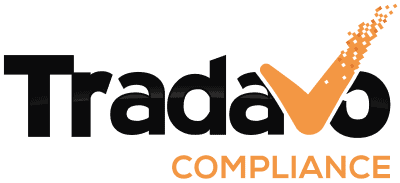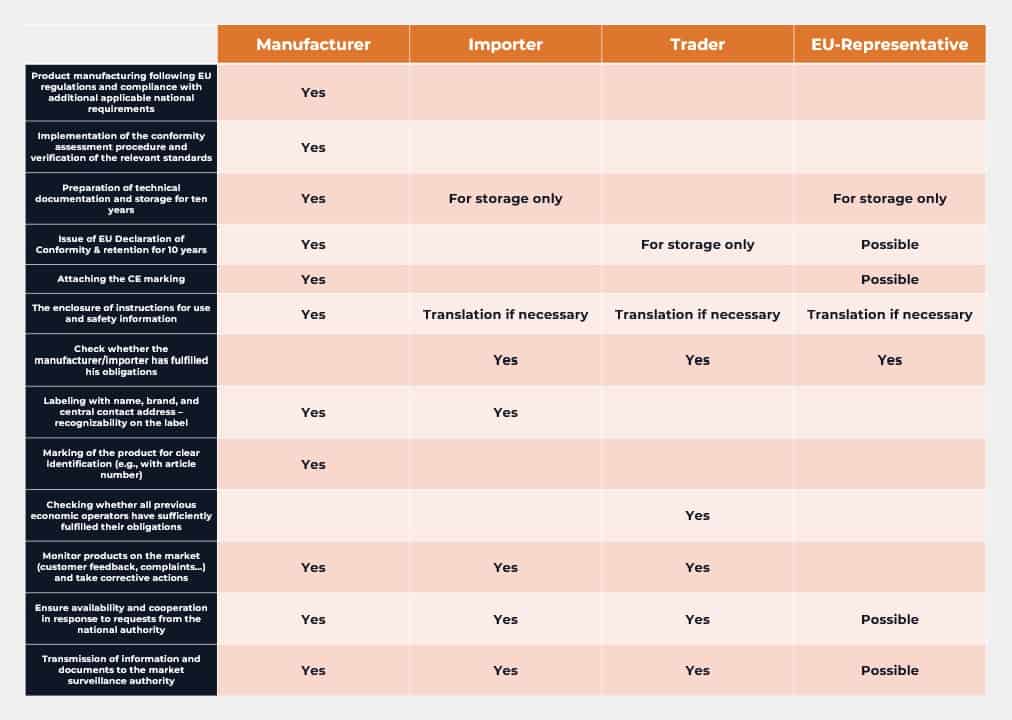Various economic operators and their obligations
Manufacturer, quasi-manufacturer, importer, fulfillment service provider, retailer, EU authorized representative… There are many terms that an Amazon FBA retailer will encounter.
This article is dedicated to the most critical (online) commerce players and their rights and obligations to avoid misunderstandings and keep you on top of things. We also want to give you a brief insight into the Market Surveillance Regulation and how it regulates EU authorization.
Economic actors along the supply chain
- Manufacturers – Have a product manufactured or remanufactured/developed and market it under their name or brand.
- Quasi-manufacturers – Have a product manufactured and then sell it under their name. Quasi-manufacturers are also liable for damages caused by the product.
- Importer – Any natural or legal person established in the EU who places a product from a third country on the EU market. For contracts with non-EU countries, only the domestic contracting party is considered the importer. Attention – forwarders, and carriers, are not importers!
- Fulfillment service provider – You can think of a fulfillment service provider as a logistics center. He takes care of the flow of goods, but also of information. In online commerce, they usually take over tasks after an online order. Therefore, they are subject to the Market Surveillance Regulation.
- Distributor – Who is considered a distributor varies depending on the product. For example, in the case of textiles, the person who places the product on the Community market for the first time is considered to be the person putting it on the market. Thus, it is essential to note that the definition of the person placing the product on the market often differs depending on the product and the regulation!
- Trader – A trader is any person in the supply chain who makes a product available on the market when it is put into service. Manufacturers and importers are usually not traders! However, if the trader purchases his goods outside the EU, he also assumes the role of the importer.
- EU Authorized Representative – The EU Authorized Representative acts as a link between the manufacturer and the market surveillance authorities. We will discuss his duties and tasks in more detail later.
The obligations of economic operators
Furthermore, the importer is responsible for applying for import clearance. Depending on the imported goods, he may require a certificate of conformity, an import permit, or a declaration of origin.
If the importer is not the (quasi) manufacturer, he must also ensure that any registration obligations are fulfilled and that the goods are correctly marked (e.g., CE marking). In the event of complaints, he must inform the manufacturer of this. He must also cooperate with the authorities.
Traders should also not blindly trust manufacturers and importers and should carefully check the validity of existing certificates.
EU authorized representatives according to the Market Surveillance Regulation
The Market Surveillance Regulation protects consumers by ensuring that products sold in the EU meet specific requirements. Utilizing an EU-based economic operator, communication between the manufacturer and the market surveillance authorities is to be facilitated so that immediate intervention and rapid corrective action are possible in a product’s non-conformity.
The main task of the EU Authorized Representative is, therefore, to cooperate with the market surveillance authorities. Typically, he is needed when a product falls into a specific category – for example, toys, electronic equipment, or even personal protective equipment – or when a product is sold on the Union market for the first time by a manufacturer from a third country such as Switzerland.
An EU authorized representative can be any natural or legal person established in the European Economic Area who has been mandated in writing by the manufacturer to perform the specified tasks on his behalf. In addition, some regulations go even further and define the exact regulatory obligations that the EU Authorized Representative must assume.

The EU authorized representative has similar duties as the manufacturer. Therefore, you can think of him as the manufacturer’s representative in the EU. He is responsible for initiating conformity assessment procedures, has extensive storage obligations in this regard, and is accountable for creating measures in the event of an unauthorized CE marking.
However, there are also tasks that the manufacturer is not allowed to hand over to the EU representative. For example, the product must comply with EU harmonization legislation, the conformity assessment procedure must be conducted, and the standards used must be valid. The manufacturer is also responsible for labeling the product with, for example, an article number and the instructions for use. The authorized representative is also not responsible for handling the import and customs clearance – this task lies with the manufacturer or the importer.
How can Tradavo help sellers from third countries such as Switzerland?
If you want to sell goods in the EU from a third country, we at Tradavo can help you make this process as pleasant and uncomplicated as possible. We not only take care of the communication with the authorities for you but also act as an EU Representative, for example, by putting our address (next to the manufacturer’s address) on the packaging of your products.
However, please note: Before any cooperation, the products must undergo a product compliance check by Tradavo to comply with the applicable directives and regulations.
You need assistance?
Who wrote this article?
As an author, Christina fills the blog section of our website with exciting and informative articles, so that our readers can always take care of product compliance in their company in the most well-informed way.





